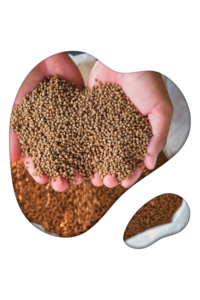Sustainable Protein Options for Pet Food Manufacturing
Pet owners are becoming more conscious of the environmental impact of their furry friends’ diets but still prioritize nutrition and quality. Traditional protein sources like beef and chicken contribute to deforestation, excessive water use, and high carbon emissions. As a result, pet food manufacturers are actively seeking sustainable protein alternatives that maintain both nutritional value and environmental responsibility to meet evolving consumer demands.
This article explores eco-friendly protein sources for pet food and how manufacturers can integrate them into their products to meet sustainability goals.
Why Sustainable Proteins Matter in Pet Food
1. Reducing the Carbon Pawprint
Animal agriculture is responsible for nearly 15% of global greenhouse gas emissions. By shifting to alternative protein sources, pet food manufacturers can significantly reduce their environmental impact while meeting consumer demand for eco-friendly products.
2. Addressing Overfishing & Land Use
The use of wild-caught fish in pet food has raised concerns about overfishing and ecosystem damage. Similarly, land-intensive livestock farming is unsustainable in the long term. Sustainable protein alternatives offer solutions to these pressing issues.
3. Meeting Consumer Demand for Ethical & Green Pet Nutrition
Pet owners are actively looking for sustainable pet food options that align with their ethical values. Brands that embrace environmentally friendly ingredients can differentiate themselves in a competitive market.
Top Sustainable Protein Sources for Pet Food
When selecting sustainable proteins, pet food manufacturers must consider both nutritional value and potential challenges. While these options offer significant environmental benefits, they also come with factors to watch out for in terms of sourcing, digestibility, and market acceptance.
1. Fishmeal & Marine Proteins
Why It’s Sustainable:
Fishmeal, derived from responsibly sourced fish byproducts, is a high-protein, nutrient-dense option that reduces waste in the seafood industry. Choosing MSC-certified fishmeal ensures sustainable fishing practices.
Nutritional Benefits:
- Rich in omega-3 fatty acids for skin, coat, and joint health.
- Highly digestible, making it ideal for both cats and dogs.
Potential Challenges:
- Overfishing Concerns: If not sourced responsibly, fishmeal can contribute to unsustainable fishing practices.
- Heavy Metal Contamination: Some fish-based products may contain mercury and other contaminants, requiring strict quality control.
- Supply Chain Volatility: Climate change and regulatory restrictions can impact the availability and cost of fishmeal.
2. Insect Protein (Black Soldier Fly, Crickets, Mealworms)
Why It’s Sustainable:
Insect farming requires less land, water, and feed compared to traditional livestock. Black soldier fly larvae and crickets are emerging as eco-friendly protein alternatives in pet food.
Nutritional Benefits:
- High in protein, essential amino acids, and healthy fats.
- Naturally hypoallergenic, making it suitable for pets with food sensitivities.
Potential Challenges:
- Consumer Acceptance: Some pet owners may be hesitant to feed their pets insect-based food due to perception and unfamiliarity.
- Regulatory Approvals: Insect protein is still a relatively new ingredient, and different markets have varying regulations regarding its use in pet food.
- Production Scalability: Large-scale insect farming requires advanced facilities, making it less accessible to smaller manufacturers.
3. Single-Cell Proteins (Algae & Fungal-Based Proteins)
Why It’s Sustainable:
Algae and fungi grow rapidly with minimal environmental impact. These single-cell proteins require little water and land, making them an excellent sustainable protein source for pet food.
Nutritional Benefits:
- Algae is packed with omega-3s and essential nutrients.
- Fungal proteins have a complete amino acid profile, supporting muscle growth and overall health.
Potential Challenges:
- Taste & Palatability: Some algae and fungal proteins have a strong or unfamiliar taste that may affect pet acceptance.
- Processing Complexity: Requires specialized production methods to ensure digestibility and safety.
- Cost of Production: Currently, large-scale production remains expensive compared to traditional protein sources.
4. Plant-Based Proteins (Pea, Lentil, Soy, Quinoa)
Why It’s Sustainable:
Plant proteins use significantly fewer resources compared to meat-based options. Pea, lentil, and soy proteins are gaining popularity in plant-based and hybrid pet food formulas.
Nutritional Benefits:
- Rich in fiber and plant-based amino acids.
- Ideal for vegetarian and limited-ingredient diets for pets with allergies.
Potential Challenges:
- Amino Acid Imbalance: Plant-based proteins often lack certain essential amino acids, requiring supplementation to ensure complete nutrition.
- Allergen Risks: Soy and some legumes are common allergens in pets, which may limit their use in some formulations.
- Anti-Nutrients: Some plant proteins contain compounds like lectins and phytates that can reduce nutrient absorption if not processed properly.
5. Cultured (Lab-Grown) Meat & Fermentation-Based Proteins
Why It’s Sustainable:
Lab-grown meat eliminates the need for large-scale livestock farming, reducing deforestation and greenhouse gas emissions. Fermentation-based proteins, like yeast-derived protein, offer a scalable, ethical alternative.
Nutritional Benefits:
- Provides real meat nutrition without the environmental impact.
- Expected to become a mainstream pet food ingredient in the near future.
Potential Challenges:
- High Production Costs: Lab-grown meat is still in its early stages and remains expensive to produce at scale.
- Regulatory Approval Delays: Governments and regulatory bodies are still developing policies for the commercial use of lab-grown meat in pet food.
- Public Perception: Some consumers may have reservations about feeding their pets lab-grown or “synthetic” meat products.
Key Considerations for Pet Food Manufacturers
- Nutritional Completeness & Palatability
Sustainable proteins must provide all essential amino acids to support pet health. Manufacturers should focus on balanced formulations that meet AAFCO and FDA standards while maintaining taste appeal for pets. - Digestibility & Bioavailability
Not all protein sources are equally digestible. High-quality fishmeal, insect protein, and algae offer excellent digestibility, ensuring pets absorb essential nutrients efficiently. - Regulatory Compliance & Market Acceptance
The pet food industry is highly regulated, and novel proteins require approval before large-scale adoption. Staying ahead of industry trends and regulations is crucial for success.
Future Trends in Sustainable Pet Food
- Rise of Ethical Pet Food Choices: More pet owners are demanding transparency in ingredient sourcing.
- Advancements in Alternative Proteins: Expect continued growth in insect farming, lab-grown meat, and plant-based proteins.
- Sustainability Certifications: Certifications like MSC (Marine Stewardship Council) and ASC (Aquaculture Stewardship Council) will play a key role in shaping consumer trust.
Conclusion: A Sustainable Path Forward for Pet Food
Pet food manufacturers must adapt to evolving consumer demands while addressing environmental concerns. By incorporating sustainable protein sources like fishmeal, insect protein, and plant-based options, brands can create nutritionally balanced, eco-friendly pet food that benefits pets and the planet.
Frequently Asked Questions (FAQs)
- What is the most sustainable protein source for pet food?
Insect protein, single-cell proteins (algae), and responsibly sourced fishmeal are among the most sustainable options. - Is fishmeal an eco-friendly protein for pet food?
Yes, when sourced responsibly (e.g., MSC-certified), fishmeal reduces waste by utilizing seafood byproducts. - Can plant-based proteins provide complete nutrition for pets?
While plant-based proteins are beneficial, they often require supplementation to ensure a full amino acid profile for dogs and cats. - How does insect protein compare to traditional meat in pet food?
Insect protein offers high digestibility, essential nutrients, and a lower environmental footprint compared to traditional meat. - What are the latest innovations in sustainable pet food ingredients?
Lab-grown meat, fermentation-based proteins, and new algae-based ingredients are gaining traction as future alternatives.
By embracing sustainable protein options, pet food manufacturers can lead the industry toward a greener, more ethical future while ensuring high-quality nutrition for pets.
Looking for eco-friendly pet food ingredients? Start exploring sustainable protein alternatives today!
